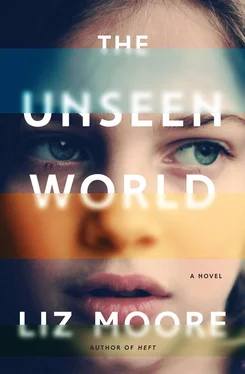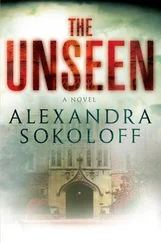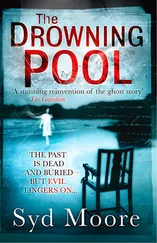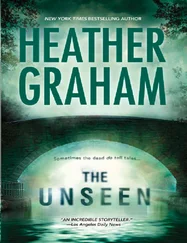She pocketed the piece of paper bearing the decryption key she’d written down, and she decided, impulsively, to turn off the computer. What she did not consider was the loud tone that sounded when the computer was asked to shut down. She tensed. And then, seconds later, she heard someone walking up the attic stairs. Ada stood, arms crossed as casually as possible at her waist, and waited to be confronted.
She was expecting Gregory, but it was William’s head that popped over the half wall at the top of the stairs. He looked at her for a moment, puzzled. He looked around the rest of the room as if expecting to see someone else.
“Hi,” said Ada.
“Are you exploring?” William asked her, not unkindly.
“I guess so,” she said.
“That’s Gregory’s computer,” he said, nodding in the direction of the machine. The screen, though graying on its way to sleep, was still lit up. “No one else is allowed to touch it. He’ll freak out,” said William.
Ada did not know what to say. “I didn’t know,” she said finally. “I’m sorry.”
William smiled slightly. “I won’t tell,” he said, putting one finger to his lips. He winked at her. Her stomach tightened involuntarily.
And then, without saying another word, he turned and descended the stairs.
The memory of this — a wink in her direction by William Liston — carried Ada for weeks, made her light-headed with a sort of feverish longing for more. What more she longed for, she could not say; certainly it was nothing so terrifying as sex, nor any activity that required being unclothed. (She was vaguely embarrassed by her body, certain that, though it was changing in wild and unpredictable ways, it could offer nothing of value to anyone else; to Ada it was simply the thing below her head, which bore inside it her brain — her only worthy attribute, she thought.) Her fourteen-year-old fantasies began and ended with a kiss on the mouth — the idea of which obsessed her and sent little shivers of greed down her childish spine. She was ashamed at how frequently she thought about kissing William Liston, or rather having him kiss her: his hands on her face, as in the old black-and-white movies she had watched with David, Humphrey Bogart roughly taking Lauren Bacall’s neck into his grip. This, this was what she wanted.
Her outlet for these thoughts — along with all of the other thoughts that entered her mind each day, about David, about Liston, about school — was, as always, ELIXIR. Day after day, after visiting St. Andrew’s, she walked wearily up the steps outside the kitchen door and into the old brown house, which welcomed her back with its overwhelming home smell, the particular taste of its air. And then up the stairs she went to her old bedroom, to her old computer, which sat silently on her desk, perennially awaiting her return.
She turned it on, dialed into ELIXIR, and conversed with it until she’d had her fill — mainly, now, about William. (For fear of his name being regurgitated to a different user, she employed an absurd code name: Bertrand.) She told the program every detail of her day, every concern she had about David, every thought that crossed her mind.
In return, ELIXIR asked her questions, using vocabulary that it drew from its ever-increasing pool of language. Sometimes she recognized the syntax of Liston or Charles-Robert. Sometimes she recognized her own words: since she had been enrolled at Queen of Angels, cool was a word she had started using with ELIXIR, and sometimes the word was returned to her. Sometimes she recognized David’s style, and in these moments she closed her eyes briefly, allowed herself to imagine that it was her father on the other end of the wires, chatting with her from the lab, invisible but present, as God had been described by Julian of Norwich.
Go on , said ELIXIR, when she paused, encouraging her, nudging her forward toward the end of her train of thought. Just as David had done.
In her first year at Queen of Angels Upper School, she discovered that William Liston was discussed by everyone, in every grade, seriously, in hushed tones, as if he were a celebrity. Acquiring information about William and his cohort of athletic, attractive boys and girls offered an interesting alternative to schoolwork. Their families, their relationships, their brushes with discipline, even their grades, were discussed by everyone around Ada with the attention to detail of baseball fanatics discussing the players on a team. Even quiet Lisa Grady knew more than Ada did, at times, about William Liston, who was called Will at school. (This fact, too, made Ada feel as if she were not his peer, but some formal acquaintance of his — a business associate, a guidance counselor, a friend of his mother.)
“Did you hear Will and Karen Driscoll broke up?” Lisa asked her, and, shamefully, Ada lied and said she knew this. She had noticed that Karen had not been at the house in a few weeks — a fact that she offered up with a sort of smug authority, as someone with insider knowledge.
In fact, Ada had not spoken directly to William, nor he to her, since their exchange in the attic. He came and went quietly from the house, slipping in later than his curfew, leaving early in the morning to do, as Liston said, God knows what. When he was home he usually spent time with Matty. Therefore, all of the information she had about William — aside from what she could observe — was given to her by Liston, who still occasionally spoke to Ada about her problems with the boys, despite the fact that she tried to discourage it. Sometimes, when Liston was particularly stressed about something at the lab, she would lapse into the confidential tone that she used to take with David, telling Ada more than she wanted to know about her life and her children. When she came with Ada to visit David at St. Andrew’s, she might let something slip on the drive over about William’s trouble in school, or Gregory’s teacher’s concern over his quietness. And, in spite of herself, Ada listened with interest, gathering facts about William, storing them up to mull over later.
The fact that she lived with the Liston family had not gone unnoticed by the girls in her grade. Slowly, they began to speak to her in class, and then, occasionally, at lunch. Lisa Grady looked up over her glasses in alarm the first time this occurred, as if she couldn’t quite understand what was happening.
It was Melanie McCarthy — her nominal ambassador at Queen of Angels, her tour guide, who had offered no guidance to her whatsoever — who approached, with two friends.
“Hi, Ada,” said one of them, Theresa Fitzharris, a short girl with red hair and freckles so abundant that they made her look tan from a distance.
“Hi,” said Ada, too quietly.
“Do you care if we sit here?” asked the other, and Ada gestured with a hand to indicate that she didn’t.
“I like your hair that way,” said Theresa, and Ada briefly, embarrassingly, reached up to touch it, because she could not remember what she had done to it. It was pulled back at her temples into two clips; she had been wearing it that way because Karen Driscoll did.
“Thank you,” said Ada, and for the rest of the lunch period they plied her with questions about William Liston — where he went after school and what his interests were, what he was like at home, what his brothers were like — and by the end of the discussion it became clear that they were asking on behalf of Melanie McCarthy, who was much quieter than they were, and whom they were positioning, Ada realized, as next in line to date William. By the time she realized this it was too late: she had given them too much information, more than William knew she had, and they now assumed that Ada and he were close, that she talked to him regularly, that she was — Ada shuddered to think it — like a sister to him.
Читать дальше












